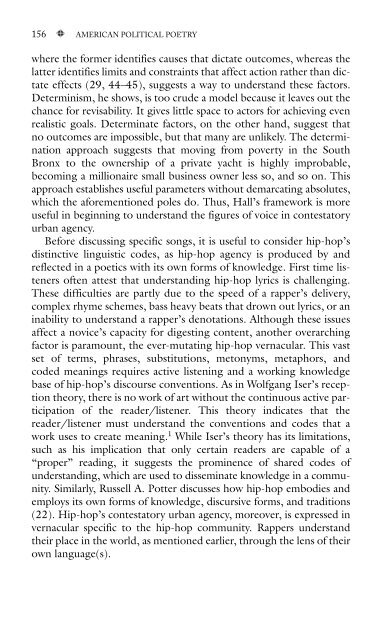american political poetry in the 21st century - STIBA Malang
american political poetry in the 21st century - STIBA Malang
american political poetry in the 21st century - STIBA Malang
Create successful ePaper yourself
Turn your PDF publications into a flip-book with our unique Google optimized e-Paper software.
156 AMERICAN POLITICAL POETRY<br />
where <strong>the</strong> former identifies causes that dictate outcomes, whereas <strong>the</strong><br />
latter identifies limits and constra<strong>in</strong>ts that affect action ra<strong>the</strong>r than dictate<br />
effects (29, 44–45), suggests a way to understand <strong>the</strong>se factors.<br />
Determ<strong>in</strong>ism, he shows, is too crude a model because it leaves out <strong>the</strong><br />
chance for revisability. It gives little space to actors for achiev<strong>in</strong>g even<br />
realistic goals. Determ<strong>in</strong>ate factors, on <strong>the</strong> o<strong>the</strong>r hand, suggest that<br />
no outcomes are impossible, but that many are unlikely. The determ<strong>in</strong>ation<br />
approach suggests that mov<strong>in</strong>g from poverty <strong>in</strong> <strong>the</strong> South<br />
Bronx to <strong>the</strong> ownership of a private yacht is highly improbable,<br />
becom<strong>in</strong>g a millionaire small bus<strong>in</strong>ess owner less so, and so on. This<br />
approach establishes useful parameters without demarcat<strong>in</strong>g absolutes,<br />
which <strong>the</strong> aforementioned poles do. Thus, Hall’s framework is more<br />
useful <strong>in</strong> beg<strong>in</strong>n<strong>in</strong>g to understand <strong>the</strong> figures of voice <strong>in</strong> contestatory<br />
urban agency.<br />
Before discuss<strong>in</strong>g specific songs, it is useful to consider hip-hop’s<br />
dist<strong>in</strong>ctive l<strong>in</strong>guistic codes, as hip-hop agency is produced by and<br />
reflected <strong>in</strong> a poetics with its own forms of knowledge. First time listeners<br />
often attest that understand<strong>in</strong>g hip-hop lyrics is challeng<strong>in</strong>g.<br />
These difficulties are partly due to <strong>the</strong> speed of a rapper’s delivery,<br />
complex rhyme schemes, bass heavy beats that drown out lyrics, or an<br />
<strong>in</strong>ability to understand a rapper’s denotations. Although <strong>the</strong>se issues<br />
affect a novice’s capacity for digest<strong>in</strong>g content, ano<strong>the</strong>r overarch<strong>in</strong>g<br />
factor is paramount, <strong>the</strong> ever-mutat<strong>in</strong>g hip-hop vernacular. This vast<br />
set of terms, phrases, substitutions, metonyms, metaphors, and<br />
coded mean<strong>in</strong>gs requires active listen<strong>in</strong>g and a work<strong>in</strong>g knowledge<br />
base of hip-hop’s discourse conventions. As <strong>in</strong> Wolfgang Iser’s reception<br />
<strong>the</strong>ory, <strong>the</strong>re is no work of art without <strong>the</strong> cont<strong>in</strong>uous active participation<br />
of <strong>the</strong> reader/listener. This <strong>the</strong>ory <strong>in</strong>dicates that <strong>the</strong><br />
reader/listener must understand <strong>the</strong> conventions and codes that a<br />
work uses to create mean<strong>in</strong>g. 1 While Iser’s <strong>the</strong>ory has its limitations,<br />
such as his implication that only certa<strong>in</strong> readers are capable of a<br />
“proper” read<strong>in</strong>g, it suggests <strong>the</strong> prom<strong>in</strong>ence of shared codes of<br />
understand<strong>in</strong>g, which are used to dissem<strong>in</strong>ate knowledge <strong>in</strong> a community.<br />
Similarly, Russell A. Potter discusses how hip-hop embodies and<br />
employs its own forms of knowledge, discursive forms, and traditions<br />
(22). Hip-hop’s contestatory urban agency, moreover, is expressed <strong>in</strong><br />
vernacular specific to <strong>the</strong> hip-hop community. Rappers understand<br />
<strong>the</strong>ir place <strong>in</strong> <strong>the</strong> world, as mentioned earlier, through <strong>the</strong> lens of <strong>the</strong>ir<br />
own language(s).










